- About Us
- Columns
- Letters
- Cartoons
- The Udder Limits
- Archives
- Ezy Reading Archive
- 2024 Cud Archives
- 2023 Cud Archives
- 2022 Cud Archives
- 2021 Cud Archives
- 2020 Cud Archives
- 2015-2019
- 2010-2014
- 2004-2009
 |
Who Cares About A Radio Station? |
Part I:
Is it Live?
Radio is changing, and in ways more subtle than the obvious. Sure, you can pay for satellite radio and not have advertisements, but there’s something a lot more important going on that often isn’t obvious.

When I worked for a Bangor newspaper in 2006, I interviewed the market manager for the local Clear Channel operation, which ran eight radio stations under one roof. He was a friendly guy who was very enthusiastic about Clear Channel’s involvement in our broad community, but while taking me on a tour of the facility, he stunned me in two ways with the same thing.
He explained how the on-air talent was not actually live on the air; instead, they prerecorded their shows. They would record snippets to introduce songs or review the set we will have just heard or to report news and sports—all stored in a computer as pieces to be cleverly delivered when planned. Even the temperature was reported based on a library of recorded snippets delivered based on the actual outside temperature reported to the computer. In this way, the market manager said, the talent could be doing other things, and listeners would never know that the voice on the air had been recorded hours before. In the lyrics of Styx, it was truly a grand illusion.
As a computer geek since 1980, I found this technological cool factor to be truly awesome. But as a radio fan for even longer, it appalled me. He was so proud of how his company was faking out the listeners, but to me it was almost tragic. To me, it seemed to devalue the importance of a real radio experience to its listeners. Maybe I was being melodramatic, but I thought he completely missed the point.

Later, at a local emergency-preparedness conference, this market manager spoke about the importance of radio to a community. Radio stations would be vital during a disaster, he said, and cited Clear Channel’s involvement in assisting the government and the citizens in the aftermath of Hurricane Katrina. After all, if the phones and cell phones and Internet are out, the radio airwaves will always be there. I remember wondering if it occurred to him that live DJs during a disaster might be beneficial as well.
I believe that this really was a good, sincere guy who was serious about caring for the community. But the reality was that his employer, Clear Channel was of course only about making money. And when it couldn’t make enough money, the company sold its pile of radio stations and left the area.
Well, so much for the importance of the community.
Part II:
Confessions of an Aging Listener
I first became musically aware in the late 1970s, and I listened to a couple of rock stations in the area—mostly because they were the stations my two older sisters always alternated between when they didn’t care for a song one was playing, or when a dreaded advertisement played. One station was WLBZ, Z-62, on 620 AM; the other was WGUY, Y-101, on 100.3 FM. What’s interesting is how those two stations would later sort of become one.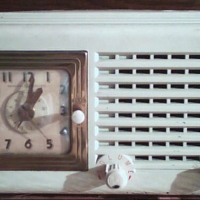
My sisters bounced between those two stations, but I kept my old analog clock radio tuned to Z-62—mostly because I felt an affinity for the DJs there. Back then, it was people like Mighty John Marshall and Bobby Russell. I loved the music, but just as much I loved the breaks between the songs, when the DJs would talk to us.
Remember that this was a time before MP3s and iTunes or even CDs. If you couldn’t afford every album or cassette for all your favorite bands, radio was how you heard all the music. Without a World Wide Web, radio was where you heard music news—unless you wanted to wait until the next issue of your favorite music magazine hit the stands. Of course, radio stations held fun contests to keep us tuned in and loyal, and those engaged us as much as the music did. But those on-air personalities were every bit as important as anything else coming out of our transistor radios and hi-fi stereos; they were the faceless voices we let into our homes, into our heads, and into our lives. They played the music that rocked our worlds, the love ballads that lit up our dreams, the catchy tunes that got us dancing.
Radio has changed around here. Stations have come and gone. Some have changed formats, dropping a genre in favor of another. Z-62 became WACZ in the early 1980s, and at some point WGUY went away. Later, famed author Stephen King, a Bangor resident, ended up owning both, more or less: What was Z62 became a talk-radio station—I listen to Red Sox games there regularly—and the frequency that once carried WGUY’s broadcasts became WKIT.
After bouncing between Z-62 and ‘80s pop stations in high school, in the 1990s I returned to classic rock, this time listening to a station that played “the greatest hits of the 70s.” But one morning I woke to discover that it had abruptly changed formats and had begun playing late-1990s pop music. This was absolute system shock to me, because that music just sucked. I stopped listening immediately. Joan, Bob, and Billy knew what they were talking about: I love rock and roll. I’d rather hear some blues or funky old soul. Hot funk, cool punk, even if it’s old junk, it’s still rock and roll to me!
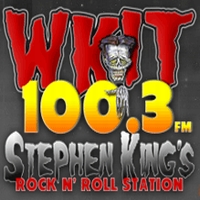
So since I’d occasionally listened to WKIT, which converted to classic rock in 1990, there I went. That was, I believe, 1997. With the exception of those Red Sox games on its sister station, I’ve only listened to WKIT for the last 18 years.
I guess I’m nostalgic. You might recall that I mentioned hearing Bobby Russell on Z-62 way back when. Bobby started there in 1978, and he’s still on the air at WKIT, doing the morning show with Mark “The Shark” Young. It doesn’t seem like Bobby’s voice has changed a bit. I’ve met Sharky a few times, and he’s a stellar guy. Heck, Bobby and Mark occasionally have the legendary Mighty John on the phone to appraise records for listeners. Talk about a blast from the past. And Jim Witt has been on the phone in the morning doing the weather since about 1982; I can remember listening to him every morning while in high school.
So there’s my nostalgia: Over 35 years later, I still get to hear the same awesome music with the same familiar voices. If that isn’t part of my rock and roll fantasy, I don’t know what is.
Part III:
“Every Day” Isn’t “Everyday”
The fun contests continue—and they’re local contests; we don’t compete against a national audience when we call in. The morning-show guys do Timeline, where callers try to guess the year four things happened in. Then they do the Morning Show Combo, where Bobby comes up with a very entertaining list of questions, and he brings in the DJs from the talk-radio show down the hall, and anyone else handy, to participate. These can be a real hoot, and I often plan my on-the-road schedule in the morning to be sure that I don’t miss it.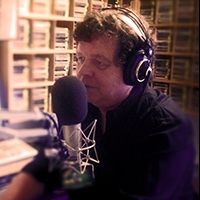
In the afternoon, Scotty Moore, the one they call ScoMo, does “Gee, Your Brain Smells Terrific,” and stumps us with some great trivia. Throughout the year, there are many other contests—the Hi-Low Jackpot, the 12 Days of Discmas, and many more that I won’t list here because the point of this piece isn’t that WKIT has contests. It’s about the feeling of belonging to a bigger family with these guys. I know those are real DJs doing live shows; I’ve called in and talked with them, landed myself on the air several times, and have listened to them take live callers and have to tell them to turn their radios down to avoid the feedback.
These DJs do us public services every day, such as announcing call-in tips from listeners. Watch out for the accident on I-95 just north of Orono, or be careful of the ice on Broadway where a water main burst. Maybe traffic is backed up for miles on outer Wilson Street in Brewer, or fog conditions on the road to Ellsworth are dangerous. Sometimes it’s just a fun tidbit someone has shared, that they then share with us.
They also make us laugh. If it isn’t the usual hilarity with the morning-show guys, it’s the amusing banter between ScoMo and Dave Isaac in the evening. Maybe it’s comedian Bob Marley calling in to the station every week to make us laugh on the way to work, or comedy clips on the Five O’Clock Funnies to make us laugh on our way home. Perhaps it’s Drifty Twitchell’s rural-Maine demeanor that has us chuckling. Or maybe it’s those very human times when ScoMo forgets to turn off his mike during a song and takes a phone call, or when Sharky seems to balk at the easiest of trivia questions during the Combo. Sometimes it’s the rare gems you’re glad you caught, like when Sarah Terror accidentally gave away the Timeline answer to everyone. You wouldn’t see that with one of those fancy conglomerate stations that prerecord everything, but I’ll take it any day, because that’s just part of the human touch—never mind the amusing aspects of doing anything live—that, to me, only echoes the importance of this station.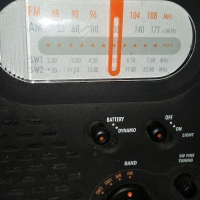
It’s a feeling of community when have the local Humane Society on every week to help find homes for pets or when they do the Zone Tree every Christmas to get donated gifts for those in need. It’s when they do pay-for-play days when they’ll play any song you want if you pledge money to whatever unfortunate event is happening. There’s nothing funnier than hearing our classic-rock DJs suck it up and play some awful tune by a talentless pop artist, the gangsta rapper of the moment, or some painful twangy country. But it’s all in good fun, and we all pitch in for a good cause. Yeah, we come together, man.
Now, WKIT isn’t the only radio station in the world like this—one that is truly live, with DJs who make your day better. It’s my personal favorite, as you can see, and I assume that there are still others like it. But there’s something very special here—perhaps, as Freddie Mercury sang, a kind of magic.
There is indeed magic in that sense of community. These DJs are real people with big hearts who do more than play music and run contests. They bring us together. They connect with us, and they connect us. If you’re content to stream satellite music in your car and listen only to national DJs who don’t even know your community exists, or to play digital music off your smartphone and never hear any DJs... well, just be sure you know what you’re missing.
Personally, I can’t imagine not having these people enriching my life.
Part IV:
Respect
This might sound like a PR piece for WKIT, but I’m not trying to get The Cud’s international audience to listen to my local radio station. I’m trying to get you to listen to the radio at all, and to consider the importance of your favorite local station to your community—and, perhaps, to your life. And, sure, it’s about hoping that if your station prerecords everything, you’ll realize that it probably isn’t as much of a community cornerstone as it pretends to be. (Hint: If it’s part of a national radio conglomerate, it probably isn’t.)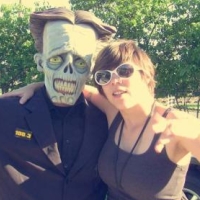
I feel fortunate that WKIT is on the air. It’s where I get my music and news, my sports and weather, and my community information. It’s where trivia exercises my brain and real people make me laugh. It’s where I can call the DJ to request a song—and usually hear it. It’s where I can participate with the listenership when ScoMo asks what we want to hear on today’s themed Classic Rock Block or when Jason “Rockdog” Roberts reminds us that “You control the rock and roll.” It’s where Dan “Elwood” Aykroyd and C.C. Rider school me on the blues, where Dee Snyder reminds of big-hair metal from the Eighties, and where Steven Van Zandt and Bill St. James take me through the decades of rock music and pop culture. And it’s where I hear Homemade Jam, which gives airplay to Maine artists who might otherwise never be heard.
But, hey, if you like pop or country, more power to you. Just find that station in your community that matters—one that cares about you and cares about that community, one that doesn’t use a computer to fool you into thinking it’s a real radio station. Go beyond the music. Like McCartney said, remember to let her into your heart.
Sometimes, the selfish part of me wonders what will happen when Stephen King shuffles off this mortal coil. Will WKIT and its sister stations go, too? Will a conglomerate buy them? Will our DJs have to record their lines in advance for an on-the-air puppet show? Will WKIT become just another big-business tentacle that cares only about sucking money out of our community? Maybe Steve should set up a trust to keep the stations going. Or maybe that breed of radio will just go away forever. That would be one hell of a bad moon rising.
That isn’t happening quite yet. Around the world there are stations like WKIT that are still locally owned and operated by people who care about their listeners and their communities. If your station is one of those—if it is as dear to you as WKIT is to me—show it some respect. Let them know, my friend, that it’s more than a feeling.
When you call your DJ to request a song, take a moment to let him know how important it is to you that you CAN request a song, and that he’s there to take your call and to play it. Tell her when you’re caller number ten and have just won the prize that you’re happy that you have the opportunity to win at all. Tell him that his show rocks, and thank him for doing it. Or send an email, or post on social media—whatever, just let them know that what they do matters to you.
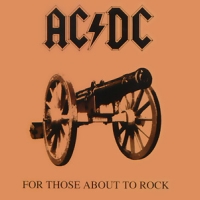
In my neck of the woods, WKIT bills itself as “The Rock.” Of course, it’s a play on being a station that plays rock music, but I see another definition there. I see it as a rock in our community—present and vigilant, timeless and honored, strong and powerful. It’s one of the few commercial radio stations left in the United States that’s locally owned. It’s also the only one in Maine—and one of the few in the nation—with live DJs on 24/7. It’s hard to imagine losing something this good.
But the times they are a-changin’, Dylan said. Radio isn’t like when I was a kid, and it will be ever more different when I’m older and grayer. Maybe it won’t be around in any recognizable form then. For me, I’ll stick with Journey: I won’t stop believing, and I’ll hold on to that feeling.
But my station is, at least for now. And a day doesn’t go by that I don’t think of how special that is to me.
Thank you, WKIT. For everything you do, every day. To you, who always rock: I salute you.
David M. Fitzpatrick is a fiction writer in Maine, USA. His many short stories have appeared in print magazines and anthologies around the world. He writes for a newspaper, writes fiction, edits anthologies, and teaches creative writing. Visit him at www.fitz42.net/writer to learn more.
